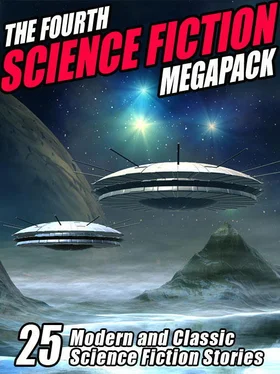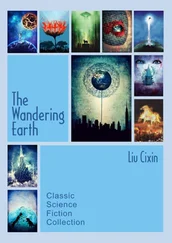THE FOURTH SCIENCE FICTION MEGAPACK
25 MODERN AND CLASSIC SCIENCE FICTION STORIES
ZORA AND THE LAND ETHIC NOMADS, by Mary A. Turzillo
Zora let them in, of course. How many friends do you have when you live in the Martian arctic? And they were friends, after all, despite their smell (days, weeks, in an environment suit did not improve the cheesy odor their bootliners emitted).
They seemed more like friends because they were young, just kids, like her. In fact they seemed even younger than Zora. None of them had given birth. She remembered the innocent kid she’d been before Marcus, before the contract with the Corps, before Mars. And before the hard hard work of making a place to live in the cold and tenuous atmosphere of a place where she was a pilgrim and a pioneer.
Even if they had been strangers, you don’t turn away travelers through the faded orange desert of Mars. To do so is tantamount to murder.
Yes, it taxed her family’s own systems, because of course she and Marcus had to offer to let them use the deduster and recycle their sanitary packs. Her family’s sparse larder was at their command She had to offer them warm baths and hot drinks, even before their little Sekou had taken his bath. They needed the bath much worse than Sekou did.
Smelly and needy as they were, they were society, animals of her species in a dangerous world of wide, empty skies and lonely silences.
It is said that Martians can take any substance and ferment it into beer, cheese, or a bioweapon. When she and Marcus first came to Mars, she naively believed they would bring their ethnic foods and customs with them. More than that, that they would revive ancient Kiafrikan traditions. They would drink palm wine from a calabash, they would learn to gengineer yams to grow in the artificial substrate that passed for soil on Mars, that they would tell old stories by the dim light of two moons instead of one bright one.
* * * *
Somehow learning Swahili takes a back burner to scraping together a life out of sand and rock and sky.
What she had not counted on was that all the Kiafrican culture that would ever come to Mars was embedded in hers and Marcus’s two fine-tuned brains, and that even researching their mother culture wasn’t going to be easy over thirty five to a hundred million miles from home, three to thirty light minutes away from the electronic resources of Earth. And when you’re that far from home (or when your home is that far from Earth), your culture consists of the entity that you owe your life to, that controls even the air you breathe, and the few humans you meet, your neighbors several tens of kilometers away, who are kind enough to tell you how to pickle squash blossoms stuffed with onion mush, how to sex cuy, and what to do if the bacteria in your recycler go sour.
Not that there aren’t traditions. One of them is the toy exchange, and thank Mars for that. Zora managed to exchange a perfectly useless sandyfoam playhouse for a funny little “authentic” camera. Somebody had bought a carton of them, along with the silver emulsion film and chemicals they ate, and Sekou, less than three mears old, had been entranced with the flat images he could make of her, Marcus, and everything else inside the hab.
If he had been old enough to wear an environment suit, he probably would have done portraits of the rover.
Marcus couldn’t understand why anybody with enough brains to stay alive on Mars would make such a thing, but it turned out it was a way of getting rid of an unmarketably small amount of silver mined from what the manufacturer had hoped to make a fortune on.
Sekou was beside himself with excitement when the Land Ethic Nomads had turned up. Not only were they new subjects for his photography hobby, they listened to his endless questions about the world outside the hab.
Listened, not answered.
The Land Ethic Nomads had different ideas about Mars than Zora and Marcus, and sometimes Zora worried that little Sekou would absorb them and want to run away with them when he was older. Zora and Marcus Smythe believed that humanity had an imperative to go forth and know the universe. One time Zora had heard a Catholic child reciting something called a catechism: Why did God make me? To know, love and serve him.
But how do you know God? By knowing the universe. And you can only know it by exploring it.
That was why the Smythes were on Mars.
The Land Ethnic Nomads had a different idea. They believed the land, meaning the surface of planets, moons, and asteroids, was sacred. Humans could try to know, to explore, But they must not destroy. If life existed on Mars, if it had ever existed, or had the potential of existing, humankind must not impose its own order over the land.
Land was sacred. All land. Even the surfaces of stars, even the spaces between stars were sacred.
Humans, they said, did not belong on Mars.
If asked why they lived on Mars, most Land Ethic Nomads would shrug and say it was their mission to convince people to go home, back to Earth.
Tango and Desuetuda pretty much left Sekou alone. Hamret liked to play with him, and admired the camera and the toy rover. But this new nomad, Valkiri, sat for long hours reading to the boy, telling him tales.
“The earth is so b beautiful. And she was so sad when her children deserted her to go to the cold, dim sky of Mars. Can you draw a picture of the sad sad Earth? Let me help you. Here’s her eyes, all full of tears.”
Valkiri’s voice faltered. She was aware of Zora standing over her. She turned the slate over and began to draw flowers (flowers!) on the reverse.
* * * *
“Marcus,” Zora whispered when everybody had retired that night, Sekou asleep on a bed of blankets at the foot of their bed, ostensibly because the nomads needed his room, but more because Zora didn’t trust their guests entirely “Marcus, they were preaching at our son.”
“Let them preach,” Marcus said shortly. “Children know what they see, not what triflers story to them.”
She curled against him, wanting the solace of his taut, warm body. She loved him better than life, angry as he sometimes made her with his silent deep thoughts. She didn’t want to outlive him. She wanted to lose herself in his body, but but she knew Sekou was old enough to notice if his parents made love. She listened a long time to the soft singing in the rooms below. Valkiri making a silky music on a polished drum, Tango’s rough bass, gruff in his Mars-dry throat, Desuetuda’s voice too soft to hear much of the time, soaring in emotion. Sweet the contrast between Tango’s damaged harshness and the sweetness of the two women and the drum. Propaganda songs.
Zora turned to him and put her hand on his chest. “Marcus, why do we have to keep them here? Couldn’t we give them some consumables and tell them to leave?”
“In the morning, Zora. Tomorrow early, I’ll invent some reason to make them leave. Tell them Sekou has an Earth virus, that should shift them out of here.”
She traced the ritual scars on his cheek. “That’s a good plan, baby. Play them for the fools they are.” Though she liked Tango and Desuetuda. It was the new one, Valkiri, she didn’t much care for.
“Is it just playing? Listen to the boy breathe. May have a virus, right enough.”
Zora fell silent. Pleading illness, her mother always said, was inviting the devil to supper. And, having lost Earth, and her family, and so much else, she sometimes wondered if Mars were enough recompense.
Sekou seemed so fragile. Nobody wants to outlive her own child.
She slept poorly and woke early.
* * * *
But the solar flare subsided in the night, and while the radiation count went down, the nomads bustled around packing. Zora had a chance to talk to Desuetuda, when the two were exchanging hydroponic stimulants recipes they didn’t want to trust to electronic mail. But Desuetuda, almost an old friend, wasn’t the problem. It was Valkiri.
Читать дальше












